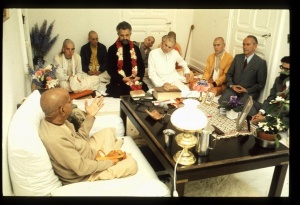SB 11.28.9: Difference between revisions
m (1 revision(s)) |
(Vanibot #0017 edit: indent verse and change id='' to class='' for SB) |
||
| Line 1: | Line 1: | ||
{{info | {{info | ||
|speaker=Lord | |speaker=Lord Kṛṣṇa the Supreme Personality of Godhead | ||
|listener=Uddhava | |listener=Uddhava | ||
}} | }} | ||
[[Category:Srimad-Bhagavatam - Canto 11 Chapter 28|s09]] | |||
[[Category:Bhagavatam Verses Spoken by Lord Krsna - Vanisource|112809]] | |||
<div style="float:left">'''[[Srimad-Bhagavatam]] - [[SB 11|Eleventh Canto]] - [[SB 11.28: Jnana-yoga|Chapter 28: Jñāna-yoga]]'''</div> | |||
<div style="float:right">[[File:Go-previous.png|link=SB 11.28.8]] '''[[SB 11.28.8]] - [[SB 11.28.10]]''' [[File:Go-next.png|link=SB 11.28.10]]</div> | |||
{{RandomImage}} | |||
{{SBnotice}} | |||
==== TEXT 9 ==== | ==== TEXT 9 ==== | ||
<div | <div class="verse"> | ||
pratyakṣeṇānumānena | :pratyakṣeṇānumānena | ||
nigamenātma-saṁvidā | :nigamenātma-saṁvidā | ||
ādy-antavad asaj jñātvā | :ādy-antavad asaj jñātvā | ||
niḥsaṅgo vicared iha | :niḥsaṅgo vicared iha | ||
</div> | </div> | ||
| Line 17: | Line 22: | ||
==== SYNONYMS ==== | ==== SYNONYMS ==== | ||
<div | <div class="synonyms"> | ||
pratyakṣeṇa—by direct perception; anumānena—by logical deduction; nigamena—by the statements of scripture; ātma-saṁvidā—and by one's own realization; ādi-anta-vat—having a beginning and an end; asat—unreal; jñātvā—knowing; niḥsaṅgaḥ—free from attachment; vicaret—one should move about; iha—in this world. | pratyakṣeṇa—by direct perception; anumānena—by logical deduction; nigamena—by the statements of scripture; ātma-saṁvidā—and by one's own realization; ādi-anta-vat—having a beginning and an end; asat—unreal; jñātvā—knowing; niḥsaṅgaḥ—free from attachment; vicaret—one should move about; iha—in this world. | ||
</div> | </div> | ||
{{SBcollapse}} | |||
==== TRANSLATION ==== | ==== TRANSLATION ==== | ||
<div | <div class="translation"> | ||
By direct perception, logical deduction, scriptural testimony and personal realization, one should know that this world has a beginning and an end and so is not the ultimate reality. Thus one should live in this world without attachment. | By direct perception, logical deduction, scriptural testimony and personal realization, one should know that this world has a beginning and an end and so is not the ultimate reality. Thus one should live in this world without attachment. | ||
</div> | </div> | ||
| Line 31: | Line 36: | ||
==== PURPORT ==== | ==== PURPORT ==== | ||
<div | <div class="purport"> | ||
According to Śrīla Jīva Gosvāmī, there are two main material dualities. The first duality is that one sees material good and bad, beautiful and ugly, rich and poor, and so on. The second is that one sees the entire material world as separate from or independent of the Supreme Personality of Godhead. The first duality, that of opposites, is subject to dissolution by the influence of time, and the second duality, that of separateness, is merely a hallucination. One who is firmly convinced of the temporary, illusory nature of this world moves about freely, without attachment. Although engaging in all types of devotional service for the Lord, such a person is never entangled and remains cheerful and satisfied in spiritual consciousness. | According to Śrīla Jīva Gosvāmī, there are two main material dualities. The first duality is that one sees material good and bad, beautiful and ugly, rich and poor, and so on. The second is that one sees the entire material world as separate from or independent of the Supreme Personality of Godhead. The first duality, that of opposites, is subject to dissolution by the influence of time, and the second duality, that of separateness, is merely a hallucination. One who is firmly convinced of the temporary, illusory nature of this world moves about freely, without attachment. Although engaging in all types of devotional service for the Lord, such a person is never entangled and remains cheerful and satisfied in spiritual consciousness. | ||
</div> | </div> | ||
__NOTOC__ | </div> | ||
</div> | |||
<div style="float:right">[[File:Go-previous.png|link=SB 11.28.8]] '''[[SB 11.28.8]] - [[SB 11.28.10]]''' [[File:Go-next.png|link=SB 11.28.10]]</div> | |||
__NOTOC__ | |||
__NOEDITSECTION__ | |||
Revision as of 06:39, 30 November 2017

A.C. Bhaktivedanta Swami Prabhupada
Please note: The synonyms, translation and purport of this verse were composed by disciples of Śrīla Prabhupāda
TEXT 9
- pratyakṣeṇānumānena
- nigamenātma-saṁvidā
- ādy-antavad asaj jñātvā
- niḥsaṅgo vicared iha
SYNONYMS
pratyakṣeṇa—by direct perception; anumānena—by logical deduction; nigamena—by the statements of scripture; ātma-saṁvidā—and by one's own realization; ādi-anta-vat—having a beginning and an end; asat—unreal; jñātvā—knowing; niḥsaṅgaḥ—free from attachment; vicaret—one should move about; iha—in this world.
Translation and purport composed by disciples of Śrīla Prabhupāda
TRANSLATION
By direct perception, logical deduction, scriptural testimony and personal realization, one should know that this world has a beginning and an end and so is not the ultimate reality. Thus one should live in this world without attachment.
PURPORT
According to Śrīla Jīva Gosvāmī, there are two main material dualities. The first duality is that one sees material good and bad, beautiful and ugly, rich and poor, and so on. The second is that one sees the entire material world as separate from or independent of the Supreme Personality of Godhead. The first duality, that of opposites, is subject to dissolution by the influence of time, and the second duality, that of separateness, is merely a hallucination. One who is firmly convinced of the temporary, illusory nature of this world moves about freely, without attachment. Although engaging in all types of devotional service for the Lord, such a person is never entangled and remains cheerful and satisfied in spiritual consciousness.